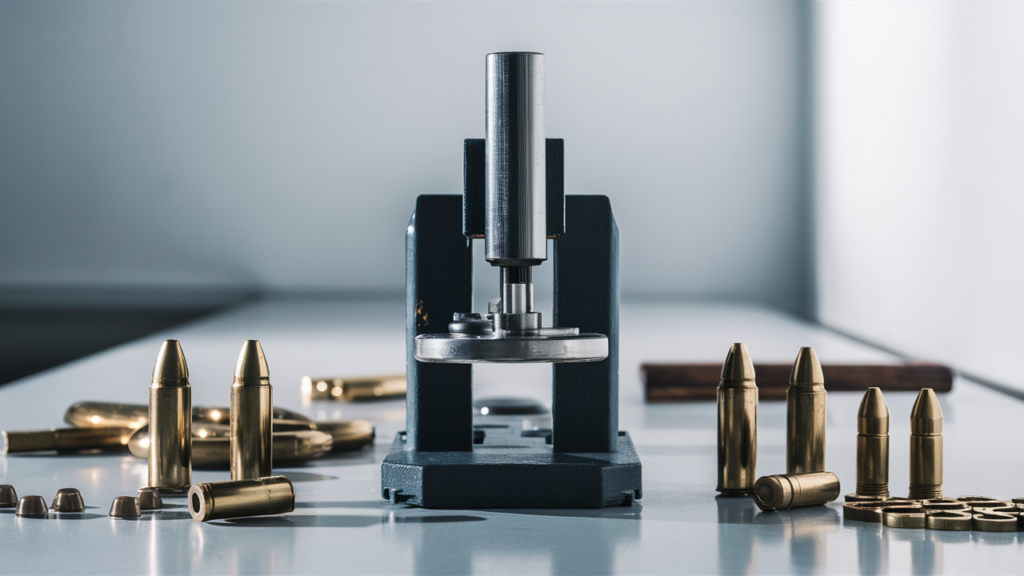Reloading your own ammunition can be a rewarding and cost-effective hobby for firearms enthusiasts. It allows you to have better control over the quality and accuracy of your ammunition. One essential component of a successful reloading setup is a reliable and efficient single-stage reloading press.
Recommended Single Stage Reloading Press 2024-2025
| Recommendation | Product |
| Best Overall | RCBS 9356 Rock Chucker Supreme Press |
| Popular Choice | Hornady Lock-N-Load Classic Reloading Press Kits |
| Best Value | RCBS Summit Single Stage Reloading Press |
| Best Budget | Lee Reloading Press Md: 90045 |
| Another Excellent Pick | Lee Precision 90998 Classic Cast Press |
In this buying guide, we will discuss everything you need to know before purchasing a single-stage reloading press.
Why Choose a Single Stage Reloading Press?
A single-stage reloading press is designed to perform one operation at a time, making it suitable for precision reloading. It allows you to carefully measure and control each step of the reloading process, resulting in more accurate and consistent ammunition.
Factors to Consider Before Buying
When selecting a single-stage reloading press, several factors should be taken into consideration:
1. Type Of Guns To Reload For:
Determine the types of firearms you plan to reload for. Different calibers may require specific reloading dies and accessories. Make sure the press you choose supports the calibers you intend to reload.
2. Frequency Of Reloading Sessions:
Consider how often you will be reloading ammunition. If you are a casual shooter and only reload on occasion, a single-stage press is a suitable choice. However, if you require large quantities of ammunition regularly, a turret press or a progressive press might be more efficient.
3. Space Considerations:
Take into account the available workspace in your reloading area. Single-stage presses are compact and may be more suitable for limited spaces.
4. Mechanical Aptitude:
Assess your mechanical skills and comfort level with operating complex machinery. Single-stage reloading presses are generally simpler to use, making them a great option for beginners.
5. Required Ammunition Quality:
Determine the level of precision and consistency you need in your ammunition. Single-stage presses allow for meticulous control over each step of the reloading process, resulting in higher-quality ammunition.

Frequently Asked Questions
Which Reloading Press Should I Get?
When choosing a reloading press, consider your reloading needs, budget, and available space. Single-stage presses are great for precision, while progressive presses offer efficiency for high-volume reloading. Consider brands like Hornady, Frankford Arsenal, RCBS, Lee, or Redding for reliable options.
Is A Single Stage Press More Accurate?
In theory, single-stage presses may offer better accuracy when loading, but this perception is not always accurate. Progressive presses can be superior for loading precise rifle ammunition in some instances.
What To Look For In A Reloading Press?
When choosing a reloading press, consider the type of guns and calibers you’ll be reloading. Evaluate your loading frequency, ammunition quality needs, and future expansion plans. Take into account your mechanical skills, space availability, and the manufacturer’s customer service.
What Is The Best Reloading Kit On The Market?
The best reloading kit on the market is the Hornady Lock-N-Load Iron Press Kit, offering quality and performance. The Frankford Arsenal Essentials Kit also provides great value, while the RCBS Rock Chucker Supreme Master Reloading Kit is a classic choice.
Additionally, the Lee Loader Classic Reloading Kit and Redding Versa Pak Pro are popular picks.
Conclusion
Choosing the right single-stage reloading press is essential for achieving accurate and consistent ammunition. Consider your specific needs, including the type of firearms you reload for, the frequency of reloading sessions, and your available space. With proper research and consideration, you can find the perfect single-stage reloading press that suits your reloading requirements.